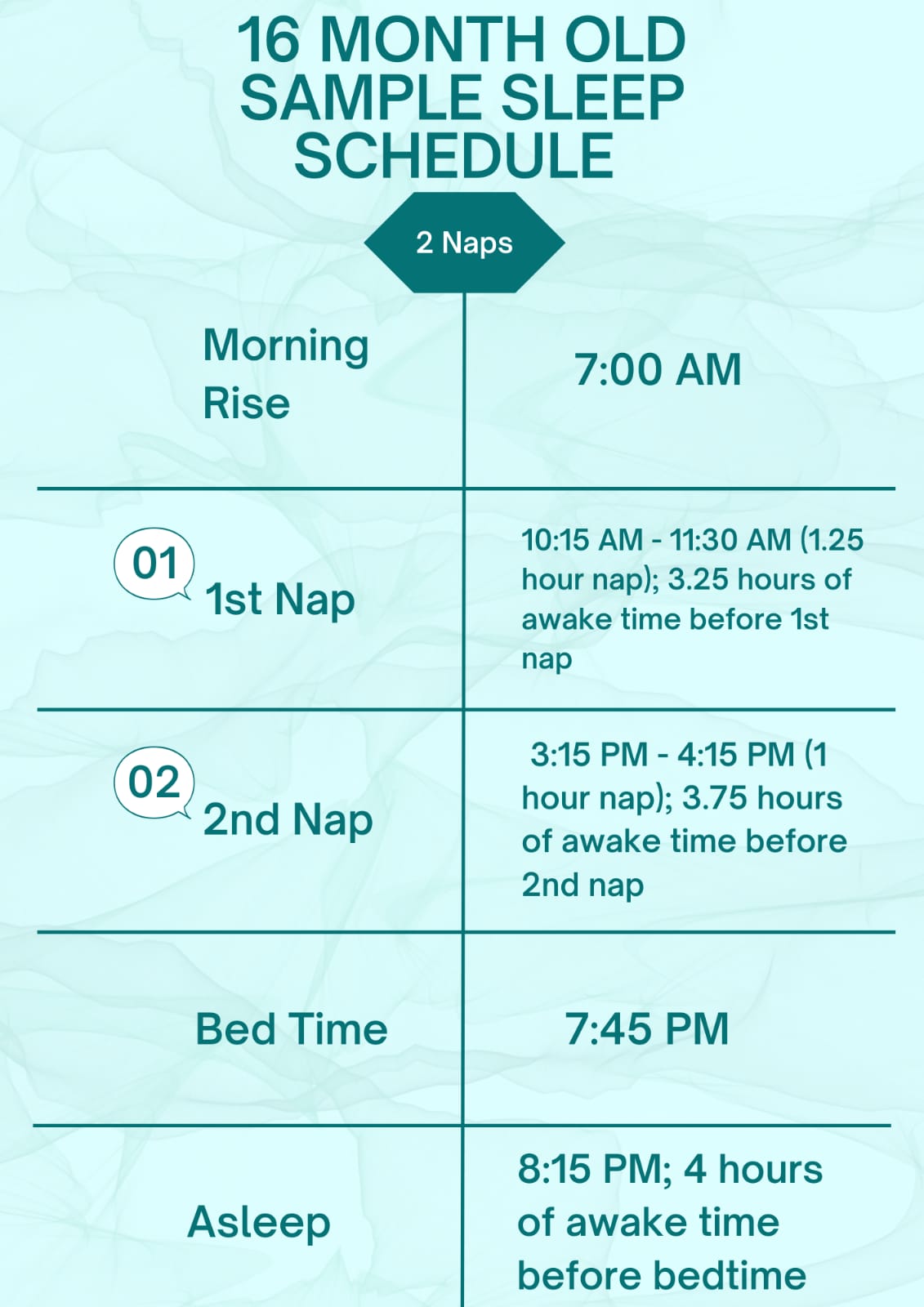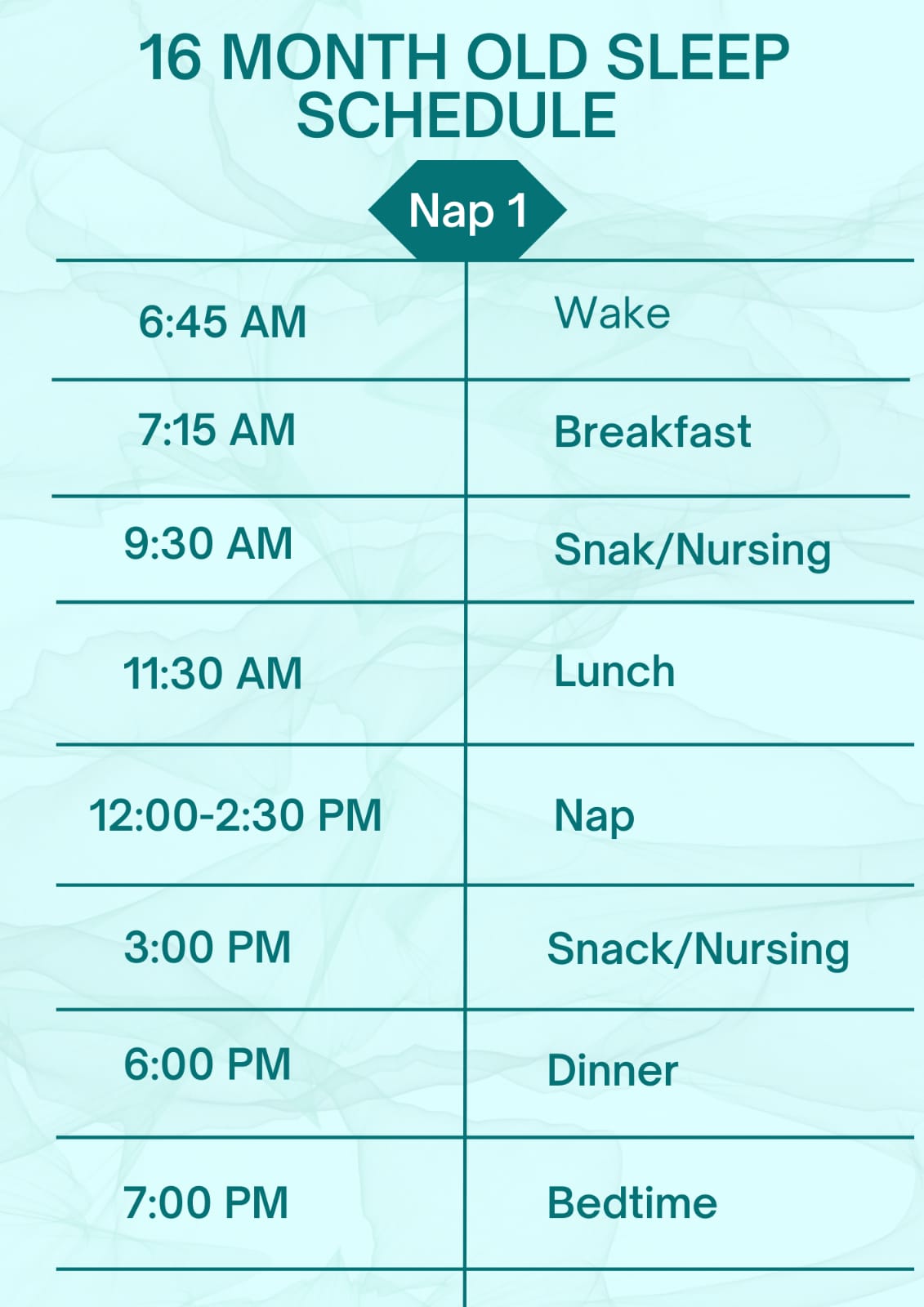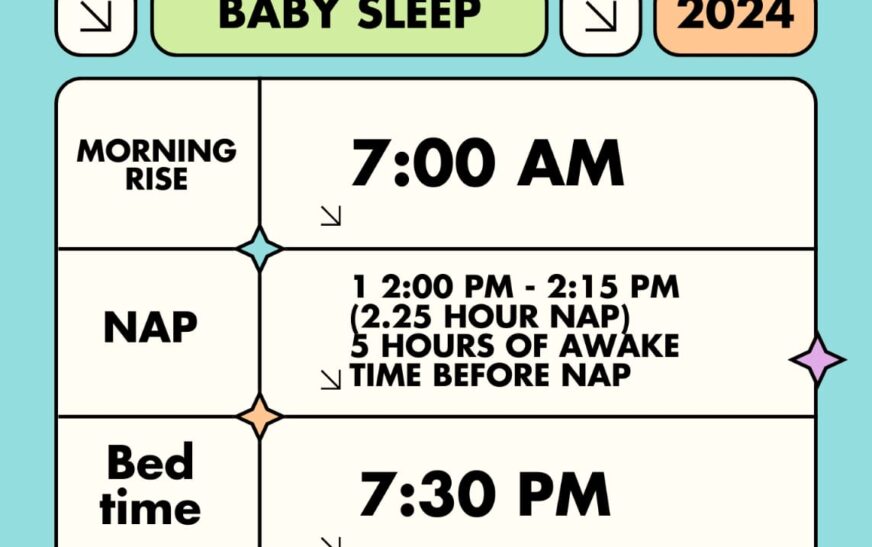A well-planned and organized sleep schedule for a 16 month old baby is crucial for their cognitive, emotional, intellectual, and physical development. It is very important that your child sleeps 12–14 hours in a day, which includes both day and night time. Consistent bedtime schedules for your child help to regulate internal clocks and recharge them properly.
Are you struggling to manage the 16 month old sleep schedule? It’s common for toddlers to resist sleeping at night and wake in the middle of the night. This makes parents frustrated and exhausted. The good news is that you can improve your child’s sleep by following a systemic sleep schedule, which can improve your child’s health.
Do you need a personalized sleep child for your 16 month old child. Reach us for expert guidance to optimize your child’s sleep. You can follow our 16 month sleep schedule with minor adjustments according to your child’s habits.
How much should a 16-month-old sleep?
It is estimated that 16 month old average sleep is about 12 to 14 hours per day. Parents are very concerned about how much sleep a 16 month old baby should have?. Nighttime sleep should be between 10 and 11 hours, and naps of 2–3 hours. Baby can take one nap or twice a day. A consistent sleep schedule is very essential at this age. There should be consistency in bedtime and naps every day, which will help them regulate their internal clock and recharge properly.
Every child is different, and their sleep can vary. Don’t be so hard on your child in following a particular schedule. Manage your sleep schedule according to your child’s energy and mood, and make sure that they are getting enough sleep.
| Average total sleep | 12 – 14 hours |
| Number of naps | 1 – 2 |
| Goal daytime sleep | 2 – 3 hours |
| Wake windows | 5 hours if one nap, 3.5 – 4 hours if two naps |
Top sleep tip for 16-month-olds
16 months is a very important age, as several developmental changes are taking place in your baby. The most important growth is that they are getting their first molars. First, molars take extra time as compared to other teeth to come out from gums. This is a painful process for your child. So it is recommended to provide more comfort to your child at this age.
Pro Tip
- Another pro sleep tip for your 16-month-old who is undergoing the growth process of first molar is to feed your child with frozen treats such as fruit popsicles, frozen yogurt bites, and frozen bananas. It will help to reduce swelling and pain due to teething.
- Give them warm baths, and dress them in comfortable clothes so that they can sleep well. If your child wakes up from sleep at night, calmly interact with him and encourage him to sleep again.
What are wake windows for 16-month-olds?
The wake window is the time period in which toddlers are awake before they sleep again. The wake window ranges from 3-5 hours for a 16-month-old baby. This time period balances the sleep-wake cycle, ensuring that the toddler is not overtired and undeterred. For a child who is transitioning from 2 naps to 1 nap, the wake window for them ranges from 3 to 4 hours. Here is a proper guideline
- Approximately 4-6 hours after awake = Nap
- 4-6 hours after the nap ends Bedtime
If a child is having 2 naps a day, then the wake window ranges from 3 to 4 hours.
- Approximately 3 hours after awake = Nap 1
- 3hours and 45 minutes after the end of Nap 1 = Nap 2
- 3.5 hours 4 hours 15 minutes Nap 2 = Bedtime
Following these time frames helps your toddlers to sleep more comfortably and easily. These are not fixed times; they may vary according to what children need.
Sleep fact for 16-month-old babies
If your child is getting too much sleep during the day, then it leads to a lack of sleep at night and regular night waking. Your child at this 16-month-old age needs naps for an average of 1-3 hours in the day. Make sure to keep your toddler indulging in different activities during the day so that they don’t sleep much during the day.
The average sleep time for a 16-month-old is about 12 to 24 hours. Allowing them to sleep more during the daytime will show adverse effects and can impact 16-month-old children’s health. Another important factor as 16 month old not sleeping through the night is that children at this age are increasingly curious about mobile phones or any screen, which can also lead to sleep disturbance. Make sure to provide a healthier environment for your child. Healthy sleep leads to better cognitive, emotional, and physical development. During sleep, the brain processes new information, improving the child’s learning and memory.
How long should a 16-month-old nap?
Baby needs 2 naps in the daytime. Total daytime sleep of a 16-month-old is 2-3 hours. Each nap should be of 1 hour or 1 and a half hours. Some of the children show a transition to a single nap. This nap usually lasts for 1.5-2.5 hours, but it varies in different circumstances.
Naps are essential because, during these naps, the child processes information, learnings, and experiences gathered before the nap. This leads to memory consolidation and emotional stability.
Naptime schedule for a 16 month old
Naps play a very crucial role in healthy sleep. If you want your child to get sound sleep, you have to schedule naptime for your baby. Especially the bedtime routine should be managed properly as it regulates your child’s sleep pattern. It signals the child’s mind and body that it is time to sleep. So a child will easily go to sleep without any resistance. Follow our guidelines to have an optimized and well-organized schedule for your 16 month old toddler.
Sample of 16 Month Old Sleep Schedule with Two Naps:
Here is a sample sleep schedule for a 16-month-old child with two naps per day.

- Morning Rise: The waking time of a child is 7:00 AM.
- 1st Nap:
- Start at 10:15 AM and end at 11:30 AM. Nap time is 1 hour and 15 minutes
- The child has 3.25 hours of awake time before the first nap.
- 2nd Nap:
- Starts at 3:15 PM and ends at 4:15 PM, lasting 1 hour.
- The child has 3.75 hours of awake time before the second nap.
- Bedtime: The child should be in bed at 7:45 PM.
- Asleep: The child falls asleep by 8:15 PM. Sometimes, children resist sleeping. There are several factors, but as a parent, you should treat them calmly and encourage them to sleep on time.
This sample sleep schedule for 16-month-old children is sufficient to optimize your child’s sleep routine.
Sample of 16 Month Old Sleep Schedule with One Nap:
Here is the sleep and meal schedule for a 16-month-old child. It breaks down the day into several sections so parents can care for their children properly.
- 6:45 AM: Wake up: The child usually wakes up early in the morning. But there are variations too.
- 7:15 AM – Breakfast: After waking up, breakfast should be done.
- 9:30 AM: Snack/Nursing: There should be a morning snack to maintain the child’s energy.
- 11:30 AM: Prepare a proper lunch for your child.
- 12:00 PM to 2:30 PM: Nap: This is the first and main nap time after lunch. It lasts for about 2.5 hours.
- 3:00 PM: Snack/Nursing: After waking up from the nap, feed the child.
- 6:00 PM: Dinner: Evening dinner is necessary. Make sure that the child does not sleep hungry; otherwise, he will wake up in
 the morning.
the morning. - 7:00 PM – Bedtime: Try to consistently follow the bedtime routine.
This schedule will help you plan your baby’s day. It ensures that your baby gets sufficient nutrition and sleep, which is vital at this age of development.
How many naps for a 16-month-old?
There should be two naps for a 16-month-old. Some children usually undergo a transition to a single nap. It should be 2-3 hours per day. Ensure that it should be in the middle of the day; there must be a gap of 5.5 hours between naps and nighttime sleep. so in this gaptime, child energy can be drained. This will help him to sleep well at night.
What time should a 16-month-old go to bed?
A 16-year-old child requires 12 to 14 hours of sleep in the day for proper cognitive, emotional, intellectual, and physical development. It includes both daytime and nighttime sleep. Normal bedtime for your child is between 7 and 8 pm. If your child naps late in the day, then it will shift bedtime later. Following a consistent routine will help to maintain your child’s intellectual and emotional health.
If your 16 month old baby refusing to sleep within 7-8 pm, wake up in the middle of the night or wake before 6 am. In this situation, try to shift bedtime earlier than 7 pm. Moving bedtime before 7 pm proves to be very helpful for your child. Move bedtime earlier if your baby misses a nap in a day or short nap time; daytime sleep is less than 2-3 hours.
Is there a 16-month sleep regression?
Some parents are confused about whether 16 month old sleep regression occurs. The answer is yes, it does occur. As a parent, you are worried about your child’s sleep. There are several causes you should know about why your child is having disturbed sleep.
- Developmental changes and progression
- Separation anxiety
- Teething
- Nap transitions
- Increased dependence
- Changes in routine
- Overtiredness
There is no need to worry; sleep regression is temporary and lasts only for 2-3 weeks. The most important thing is to stick to a consistent sleep schedule. This will help to reduce your 16-month-old toddler’s night wakings. Toddlers at this age are very active; they need a proper diet during the day. Taking the required calories helps them to prevent night wakings due to hunger.
Why Won’t My 16 Month Old Stay Asleep at Night?
Usually, children at this age show resistance to going to bed. Parents get frustrated about why their 16 month old not sleeping through night. There is no need to worry; this kind of sleep problem is temporary. If the baby is having normal sleep and a sudden change occurs, then he starts waking up at night. Then look at your child; he may be suffering from some physical (teething or any other illness) or environmental discomfort. We will discuss several reasons for night wakings.
Your baby is not tired much.
At this age, a child refuses to go to bed or sleep. One reason your 16-month-old won’t sleep is that he has taken too much sleep during the day. This can cause disturbance for you and your child at night. So, it is recommended that they add 15-20 minutes more in their wake window period. The child will slowly adjust to this routine.
Your baby is transitioning to one nap.
Being a mother, you are concerned Why does my 16-month-old constantly wake up at night? You need to understand and learn that 16 months old is the age when a child transitions from 2 naps to 1 nap. As they grow, their need to take naps reduces. Signs that help you recognize that your child is ready to transition for one nap are
- resisting to sleep in one nap,
- taking more time to fall asleep
- frequent waking in night sleep
This can be reduced by shifting the morning nap to midday and shortening the second nap. With time, shorten the second gap until it is dropped.
Your baby is suffering from separation anxiety.
16 month old separation anxiety occurs when a child discovers his surroundings and interacts with them. He gets attached to his parents and his surroundings. So separation anxiety can be a reason for your 16 month old not sleeping at night. He may wake up and find it difficult to sleep without his parents.
Pro Tip
They may show their resistance to sleep or protest by standing in the crib and crying when they enter the room. Separation anxiety can be reduced by playing games like peek-a-boo that will help babies ease separation. Also, reassure them before leaving; this will help a lot.
Your baby is learning new experiences.
Your child is excited to learn new experiences and skills during the day. They are learning how to walk, talk, and solve very simple problems. This can lead to overstimulation and overexcitement that make it difficult to fall asleep in bed. During the brain is processing new information and experiences the child gathers during the day; this can often cause sleep disruption.
Your baby’s sleep environment matters a lot
Noise, room temperature, and clothes. The child is wearing a bed where he sleeps; all these things matter a lot. Try to provide a comfortable environment for them. This will encourage them to fall asleep at times.
Your baby is overtired
This problem occurs when children are transitioning to one nap. As the wake window period has also increased, they are overtired and exhausted at night. In this way, their body releases stress hormones like adrenaline and cortisol, which leads to frequent night waking. Try to shorten the wake window; this will help them a lot to reduce their tiredness.
Your baby is hungry
If your baby hasn’t taken much food during the day, he will definitely wake up at night due to hunger. So make sure to feed them properly before sleep.
Can I sleep train my 16-month-old?
Yes, you can sleep-train your 16-month-old child. At this age, a lot of children develop sleep associations such as feeding, being held in hands for falling asleep, and needing to be cradled. Your major aim should be that you make your child sleep independently without any association and tease your child with ease, comfort, and calmness if he wakes up from sleep.
A lot of parents ask the question that how to slaap train 16 month old baby? There are several sleep training methods that you can use to ensure that your baby sleeps healthy and comfortably. These methods include the feeder method, cry it out, chair method, pick-up, pick-down method, and fading method. These approaches help your child settle down on their own and will reduce intervention with time.
So, sleep training a 16 month old requires patience and persistence. You can only sleep train your child if you maintain a consistent bedtime routine. Prepare yourself for some resistance from your child. But don’t worry; toddlers will adjust with time.
What are some 16 month old milestones?
There are several great things happening when your toddler is 16 months old. The following events occur at 16 month of age:
16 month old developmental milestones:
16 months is the age when your child’s growth is maximizing daily. Your child is able to walk, climb, and play with toys.
Walking and Climbing:
Many 16 month olds are walking well and may start climbing, running, and dancing.
Fine Motor Development:
At this age, they can stack blocks, turn the pages of a book, and play with crayons.
Language and Communication:
Your child’s communication and language skills are developing quickly at this age. They are observing their surroundings and learning more.
Speech:
They can speak about 10-20 words. Which include mom, ball, and no
Cognitive ability:
They understand more than they can do, and they may follow simple instructions.
Developing Social and Emotional Skills
At this age, your child starts taking an interest in pretend play. They are great imitators of adults and will engage in simple pretend play, like using a block as a phone and feeding a doll.
Separation Anxiety:
This is the age when a child suffers from separation anxiety. Keep an eye on your child to see if separation anxiety symptoms appear.
Cognitive Development
At this age, your child’s cognitive development is progressing rapidly. Cognitive development helps children explore new adventures. At this age, they are able to learn about object permeance.
Analytical Skills:
They love to be involved in their surroundings; this promotes problem-solving skills. They begin to figure out simple problems.
Memory:
They continue to remember their routine experiences and learning.
Final thoughts
Try to be very consistent in maintaining your child’s sleep routine. If your child has a consistent routine of sleep, they will have better mental and physical development. Maintain snack, feed, and sleep time together, as this will keep your child energized and strengthened. Whether your child has two naps or one nap a day, always watch sleep regression signs. Consult a pediatrician if your child is constantly having sleep issues.









